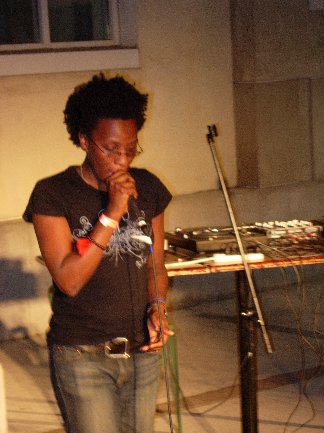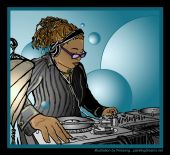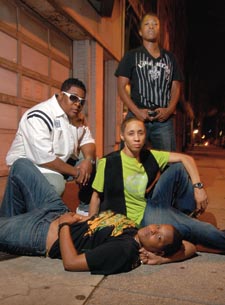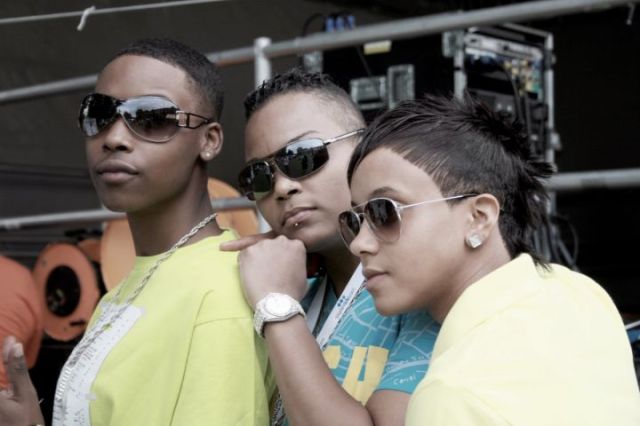So I owe you one for yesterday . . . know this is not my area, but like I said these posts are about challenging my knowledge as well as yours. 😀
In mainstream feminist analysis of rap music, rap is the villain in which black thugs demean and debase both black and white women. The music becomes the emblem of a narrative in which black culture is more misogynist than the dominant culture and black men are more violent than other men. Thus the actual misogyny of much of rap music is filtered through the engendered racism of mainstream society in ways that erase the misogyny of mainstream culture both in its relationship to rap music, in which white male fantasies of masculinity are grafted on to those of black males ones in order to create a product that is then emulated in the sexist and misogynist encounters between white male suburban youth and their white female suburban girlfriends, and other forms of gender based abuse and inequality that exist outside of any rap or hip hop narrative.
Racial filtering also masks the libratory power of certain kinds of hip hop. Not only has hip hop been credited for giving voice to the forgotten urban slums and the plight of black youth within them, it has also been the source of feminist talk back. While there is nothing liberating about having a credit card swiped through a black woman’s cheeks none could argue that Queen Latifah’s “Lady’s first”(featuring Monie Love)
or Salt’n’Pepa’s “She Thing” were anything but feminist anthems.
In the former, there is a very clear narrative of black female empowerment that places it within a context of strong African and African diasporic women. Its unfortunate use of war footage and imagery to show women reclaiming Africa could also be reclaimed through the lens of previous African queens who once ruled vast empires across the content. It’s not a metaphor I would choose but certainly one that still pays homage to a female power narrative. The video also does something different with female sexuality, at once avoiding the spandexed “big butts” for clothes expressing black pride and putting forth a queer aesthetic. While I think the later was unintentional, it certainly could be credited as one of the moments in Rap video that paved the way for queer artists.
Salt’n’Pepa’s video played more clearly into an existing narrative of sexualized imagery on the screen. However, the used it in a similar vein to the soundtracks of the black exploitation films in which the image may put forward a standard narrative but the music decidedly critiqued. Thus they appear in shorty shorts and low cut tops in almost every frame, but all the while singing about how women can be anything they want to be and have the right and the strength to define their own lives as independent women:
It’s a she thing, and it’s all in me (It ain’t nothin’ but a she
thing,
I could be anything that I want to be baby
….
Go to work and get paid less than a man
When I’m doin’ the same damn thing that he can
When I’m aggressive then I’m a bitch
When I got attitude you call me a witch
Treat me like a sex-object (That ain’t smooth)
Underestimate the mind, oh yeah, you’re a fool
Weaker sex, yeah, right, that’s the joke (ha!)
Have you ever been in labor? I don’t think so, nope
I’m a genuine feminine female thang
Can you hang? Ain’t nothin’ but a she thang
(Salt’n’Pepa “She Thang”)
Not only do these lyrics put forward an empowered female anthem, they raise traditional feminist issues like equal pay, sexual agency, and misogyny. In another part of the song, they also pay homage to Peggy Lee’s “I’m a woman” reminding all of us that ultimately feminist theory always references across difference even tho we traditionally teach it as separated by various identities to the disservice of the movement(s).
Even now, my students who know Latifah as the Loreal woman and Salt’n’Pepa for their degrading reality show, still manage to find these and other feminist lyricists from the black female rap world to bring to class year after year as an example of feminist music. And yet feminist Hip Hop artists are astutely aware of how their voices are edited out of mainstream feminism as part of an anti-feminist industry:
They say it hurts
“It hurt when you talk like that”
They say it hurts
“It hurt blacks”; they talk back
They say it hurts
“It hurt women in rap”
They say it hurts
“It hurt. We rap back”
We gots a Message”
~Shayna “Sheness” Israel
12/19/07
In this excerpt from 3X a LADY CREW, a queer feminist Hip Hop group out of Bryn Mawr, undergraduate scholar Shayna Israel reminds that decolonizing theory opens the possibility to see the “message” in the music and other arenas that have been sworn off as feminist no fly zones. Taking her feminist praxis seriously, Shayna teaches high school and middle school students how to express themselves and critique the inequalities in their lives through hip hop, spoke word, and creative writing.
In fact, feminist hip hop has always been a place for girls and women of all ages. Prior to her hater turn, 14 year old Roxanne Shante, for instance, made it big with songs critiquing male rappers who sold out the message of poverty and oppression for money. She also was one of the youngest successful artists to rap about catcalls on the street and to break down not only the male privilege involved but also the hypocrisy of “shiftless” men hooting at women and girls trying to get an education or go to work.
What has been largely absent from both male and female hip hop artists work is a question of heteronormativity and hyper-dominant-heterosex. Thus power shifts from largely misogynist male gangsta fantasy to dominating/dominatrix heterosexual female ones. Often hidden are those heterosexual rap songs in which mutuality (be it vanilla or kink) are centered. This again is as much an issue of marketing as anything else, in which mainstream commercialization of rap requires the selling and buying of racial stereotypes: violent black men and angry black women putting their sex out there for mainstream consumption and misappropriation. Even more hidden are those rap artists who are using rap as a revolutionary form from which to critique heteronormativity and heterosexism.
(MzFontain and friends)
While we have had many books and articles discussing the revolutionary power of rap as an art form for critiquing poverty, racism, colorism, classism, colonialism, and other major political and social forms of oppression no such cache has been given to those books and documentaries that look at the ways female artists around the world have claimed rap as a space to voice female empowerment and critique sexism nor to voice same sex desire and critique homophobia and hetersoexism. While documentaries on women in rock can be found in almost any women’s center or women’s studies library, very few stock either Nobody Knows My Name , which is about the unacknowledged female artists in the industry, or Pick Up the Mic, which focuses on the growth of “homohop” and queer artists. What is lost in this erasure is in fact the black (and global) feminisms, especially queer ones, within rap music.
“I’ve got you Babe” – Mélange
In this ode to her son and her family, young queer artist Mélange Lavonne expands the growing genre of rap expressing love for one’s children and family and places it decidedly within a queer narrative. Her song is particularly important in the post-prop 8 era in which it simultaneously critiques homophobic constructions of the queer community as predatory and racism that edits out both black and bi-racial families from the mainstream depiction of queerness.
Though relatively new, Mélange Lavonne’s contribution to the rap scene promises to be significant. As an artist that started out with a debut album devoid of homosexuality, she had developed a “mainstream” audience who then followed  her to her sophomore album in which she is out and her subject matter includes critiques of homophobia and heterosexism. The shift was not only one that Lavonne credits for her own empowerment but also helped expand the audience for “homo hip hop.” She also wants to start her own label to make sure that other young women have access to an industry that feminists have rightly labeled notoriously sexist.
her to her sophomore album in which she is out and her subject matter includes critiques of homophobia and heterosexism. The shift was not only one that Lavonne credits for her own empowerment but also helped expand the audience for “homo hip hop.” She also wants to start her own label to make sure that other young women have access to an industry that feminists have rightly labeled notoriously sexist.
Artists like Shante Paradigm are also shifting the image of hip hop at both the lyrical and structural level. Her own music combines issues of gender, sexuality, race, and popular culture from a decidedly feminist lens. She is also the co-founder and Exec Producer of Peace Out East Festival, an east coast hip hop festival for queer rap artists.
Black queer feminist rappers not only discuss sexuality but also issues of gender oppression and racism. Artists Kin4Life breakdown such themes as environmental racism, black male misogyny, and other issues in this impromptu rap for an interview in 2008:
Their work also tackled issues of emotional abuse, healthy vs. destructive relationships, and desire. They are also important to the genre because their videos highlight empowered femmes not just studs.
Other artists, like J P.O.W move the discussion into spiritual connection between women and the connections of black women across the diaspora. Her song Earth Walker with Las Krudas (amazing Afra-Cubana hip hop artists) mixes languages, sounds, and forms in order to explore the power of African diasporic women on this earth. You can listen to many of her songs at her myspace page: here.
women across the diaspora. Her song Earth Walker with Las Krudas (amazing Afra-Cubana hip hop artists) mixes languages, sounds, and forms in order to explore the power of African diasporic women on this earth. You can listen to many of her songs at her myspace page: here.
While most of these artists are young, we cannot forget the woman who is largely credited as starting the movement: Missy Elliot. While she has never explicitly addressed her sexuality, it is common knowledge that Missy plays on the home team. Her work with many of the mainstream rap and R&B artists in the industry has exposed all of them to a competent, successful, black lesbian rapper. That exposure and her own success as an artist have no doubt opened space for others since.
The influence hip hop has had on feminist and queer thinkers and spoken word artists is not limited to African  Americans, all though it does come out of a particular African diasporic his/her/hirstory. If this was not black history month I would obviously highlight some other key artists that I have featured on this blog before. And while I have focused on some big name artists here, I hope that some of these others are people you do not know, since the point of these posts is to highlight the lesser known women in our shared histories. Other artists that I was unable to feature but that may be of interest: MZ Jonez (Shayvonna Jonz), Dr. P, E-cliff, Dalyrical, BOI Sha, Mz. Dyzihre, and Feloni, and so many others.
Americans, all though it does come out of a particular African diasporic his/her/hirstory. If this was not black history month I would obviously highlight some other key artists that I have featured on this blog before. And while I have focused on some big name artists here, I hope that some of these others are people you do not know, since the point of these posts is to highlight the lesser known women in our shared histories. Other artists that I was unable to feature but that may be of interest: MZ Jonez (Shayvonna Jonz), Dr. P, E-cliff, Dalyrical, BOI Sha, Mz. Dyzihre, and Feloni, and so many others.
Obviously this post is simply scratching the surface. For more information on queer artists check out:
Related Articles
- Slideshow: theGrio’s 15 favorite female MC’s (thegrio.com)
